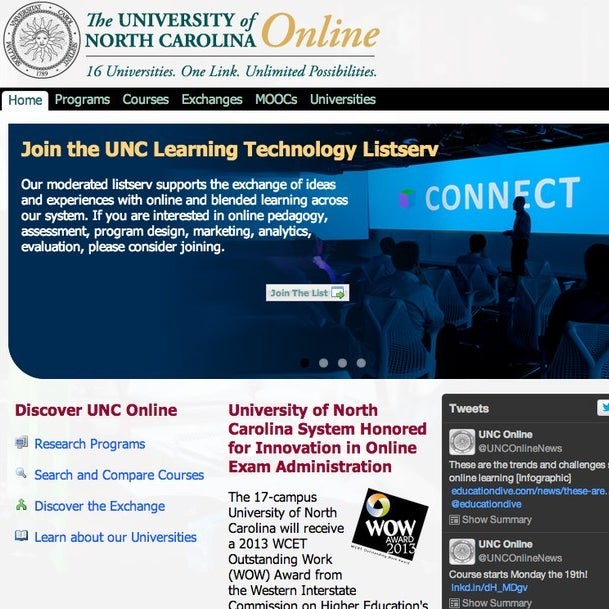

The new site for UNC Online, designed by Ranku (left), and the old site (right).
The University of North Carolina went to Kim Taylor with a problem: When it came to online degree programs, the prestigious university system was losing students by the thousands to for-profit colleges. UNC Online was under pressure to scale online enrollment — which can offer a much-needed flow of revenue to cash-strapped state universities — but it was struggling to recruit even students in its own state, especially veterans at places like Fort Bragg, the country's largest Army post, who have been enrolling at for-profit colleges in sharply increasing numbers.
Despite the UNC system's near-universal name recognition and lower tuition prices, potential students were turning to schools like the University of Phoenix and DeVry in large part because of UNC's own clunky, confusing website. The site's traffic showed that visitors would leave after just few minutes, unable to find basic information about degrees, programs, and tuition costs.
That was why the university sought out Taylor, the co-founder CEO of a year-old ed-tech startup called Ranku. Ranku's own website helps students easily search for and compare online degree programs at a wide variety of nonprofit universities; UNC wanted Taylor and Ranku to design and power UNC Online's site with an an eye toward winning back the prospective students it had been losing to for-profits. It was a departure for the company, which had never designed a site other than its own, but Taylor saw it as a unique opportunity to expand her business's scope and help a storied university system badly in need of a new site and new students.
When it comes to recruiting students, for-profit colleges are the undisputed kings of the web, with huge advertising budgets, sleek websites, and a keen understanding of how students choose colleges and degree programs. Taylor and her co-founder are intimately familiar with for-profits: Taylor worked at a Silicon Valley startup that focused on digital marketing and strategy in for-profit online education, and her co-founder had worked extensively with industry lobbyists.
"The state of North Carolina and other nonprofits are at a distinct disadvantage compared to schools like Phoenix and DeVry" in the online space, Taylor said.
Ranku's sleek new UNC site, which launches today, borrows heavily from the for-profit playbook. The site is centered around a search-by degree interface, Taylor said, because unlike at brick-and-mortar schools, where students first choose the school they want to attend and then decide on their degree, online students typically come into the process with a degree in mind and pick a school that can accommodate them. Web users are used to getting the information they need quickly and easily, so on the new site, simply typing in "business" calls up a list of related degrees — and a single click on a degree program calls up a host of basic information such program length, cost, and acceptance rate. On UNC Online's old site, students had to navigate a complicated maze of clicks and many-page lists, then do their own math to find out the total cost and length of the program.
Ranku and UNC also plan to eventually roll out a portion of the site devoted specifically to veterans, Taylor said, with a military-specific interface and a component that will allow users to research using their GI Bill benefits. UNC Online expects to have an influx of interest from veterans in the wake of an August bill that requires universities to offer recent veterans in-state tuition no matter where they reside. The University of Phoenix already has a site aimed specifically at veterans.
Nonprofits like the University of North Carolina may struggle to compete with for-profits when it comes to online marketing, but they also have a unique advantage, Taylor said. For-profits often spend millions of dollars on so-called "lead-generation" sites, where they pay for information about students collected on generic-sounding websites like bachelorsdegree.com. "That's the beauty of nonprofits, they don't have to market themselves as much," Taylor said. "They have this brand, so they're organically bringing traffic to their website — they're just not converting it."
Taylor said the partnership with North Carolina — an agreement that spans several years — doesn't mean a complete shift in direction for Ranku, whose lead investor is Mark Cuban. But she sees a potential for similar work with other state university systems, several of whom have already approached Ranku for help.
